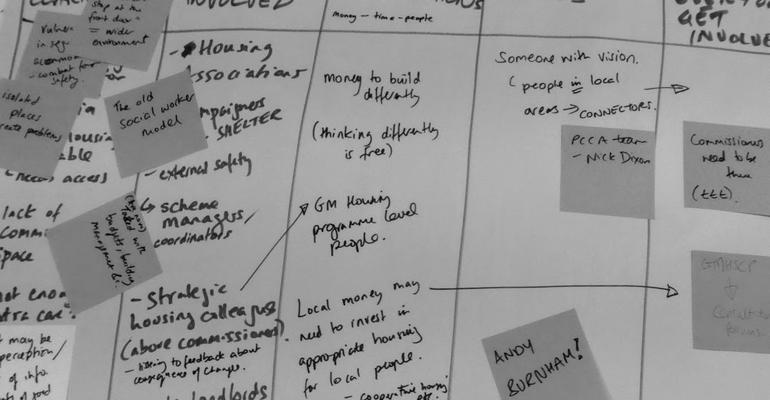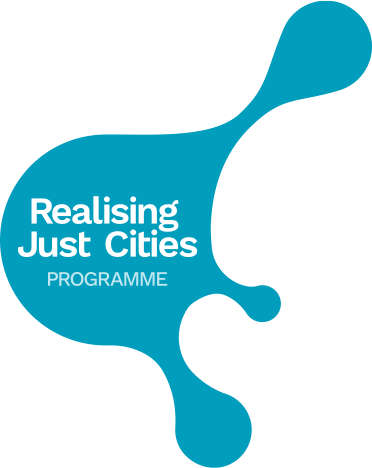New Recommendations on Care at Home

What would it take for people to live a good life at home for as long as they choose?
This was the central question for The Care at Home Challenge, a citizens’ inquiry coordinated by Shared Future CIC on behalf of the Jam & Justice Action Research Collective.
On Wednesday (12th December), around 40 participants and stakeholders including commissioners, care providers, health workers, and other interested citizens came together to examine the recommendations that have emerged. As those present introduced themselves, they expressed both professional and personal lived experience as their reason to attend the launch of the recommendations.
Fundamental transformations in Greater Manchester
Speaking in his role as chair of the Greater Manchester Health and Social Care Partnership’s Living Well at Home Transformation programme and as a Director of Adult Social Services for Stockport MBC, Mark Fitton acknowledged a tendency to think about care in “just statutory” terms, explaining how he now hopes to build a relationship with care providers that is more than merely contractual. He identified alignment between the inquiry findings and his and his colleagues’ aspirations for adult care. He highlighted the importance of recognising the role of unpaid carers, individualised approaches, and support for the workforce, and finished by pledging that “The work you have been involved in is valued and will contribute significantly to the work we have undertaken to date”.
An Inquiry with a difference
Inquiry lead Jez Hall went on to explain how the process had differed from a regular Citizens’ Inquiry: The ordinary first step would be to recruit participants from the general population. The Care at Home Inquiry inverted that process by recruiting participants from a specific population: people who work, at different levels, within Health and Social Care. The Inquiry question was formulated by a reference group comprised of Commissioners, NHS, academic and VCSE representatives. The Inquiry then heard from commentators with a range of relevant lived experiences and perspectives, meeting weekly on six evenings to pursue their investigation.
Themes and application
In the spirit of that process, this was not a typical launch event—those present became part of the endeavour, taking the “What” and “Why” and working together in small groups to consider “How” the different recommendations might be achieved. The recommendations were introduced by Inquiry participants, and grouped thematically enabling those present to opt in to a focused discussion of their choosing.
- Under the heading of Commissioning and Service Reform, discussants were asked to consider how to make commissioning practices less rigid and move way from “time and task” services, to prioritise early intervention, and to identify ways to recognise the contribution of unpaid carers.
- Informed Choices and Patient Involvement brought together recommendations for long-term planning (such as Care navigation models available from 18+), cross-sector integration for better sharing of resources and information, and attention to individuals’ personal wishes—the loss of people’s life stories undermines wellbeing.
- Recommendations around Valuing Care Staff included establishment of a professional body for social care workers, improving terms and conditions, and creation of a banding structure that would reward experience and qualification, rather than simply age and long service.
- Infrastructure and Technology embraced the wider necessities to provide safe and suitable accommodation, good public transport, and appropriate technology. Frequently mentioned was how personal data could be shared more effectively if it was owned by the individual and not by discrete and often poorly integrated services.
The discussions were very focused, with one participant describing how the discussion group had “gelled . . . [and] quickly become a think tank”, and another group reporting back a desire to keep thinking and talking further, to get the recommendations put into action. Others in the room pledged to share what they’d heard with colleagues who couldn’t make it, and to look again at the models used to value work in healthcare and homecare.
What’s next for us?
The full report of the Inquiry will be available from Shared Future CIC and on this website, as soon as the event’s “Hows” have been incorporated. If you would like an alert when the report is available, sign up for the Jam & Justice mailing list or follow @jamandjustice on Twitter. Other documents are available for download at the bottom of this page.
The Action Research Collective anticipate taking these conversations forward through Jam & Justice’s emergent Coalitions for Change. As ARC member and Care at Home project co-designer Andrew Burridge (NW ADASS) said on Wednesday, the idea behind Jam & Justice is that “having better conversations leads to better service, and to a better society”. Coalitions for Change is an opportunity for others to join us on the way to co-producing that better society, especially across the Greater Manchester city region.
About the team
The Care at Home Challenge built on an original co-design idea created by the Action Research Collective as part of Jam & Justice. The delivery team, who also refined the experiment design, were: Amanda Preece (Mill Research), Andrew Burridge (NW ADASS), Jayne McFadyen (Shared Future), Jez Hall (Shared Future), Katie Finney (Amity), Liz Richardson (Manchester University). Data collection was carried out by Jam & Justice researcher Susanne Martikke (GMCVO).
DOWNLOADS
- Briefing paper about the inquiry (PDF)
- Presentation (slides) from the launch event (PDF)
- The Inquiry Recommendations (PDF)




